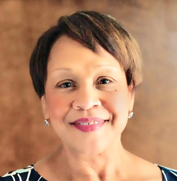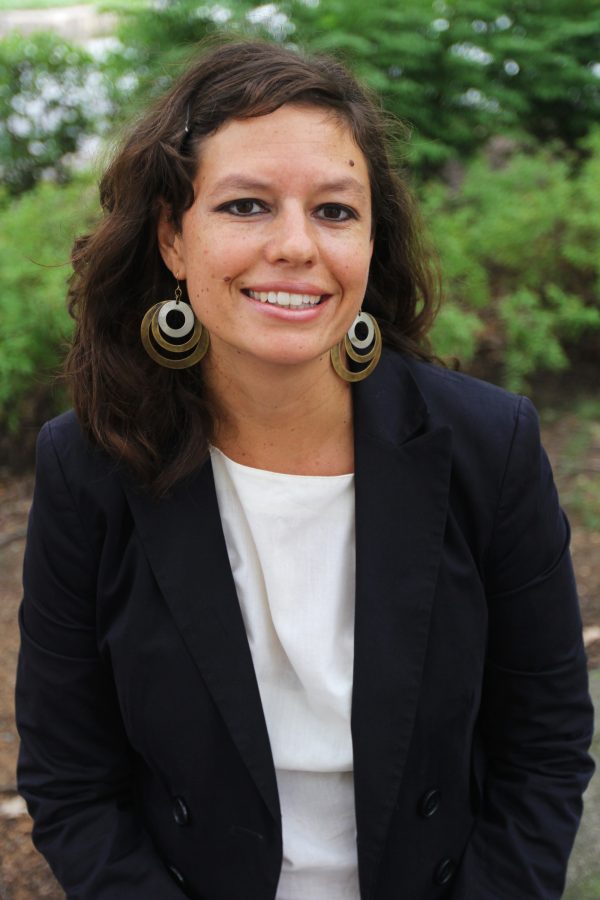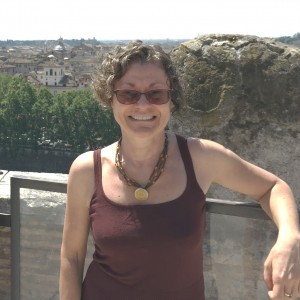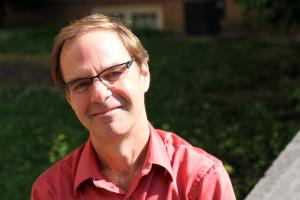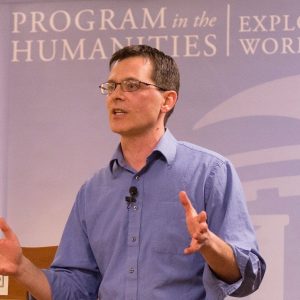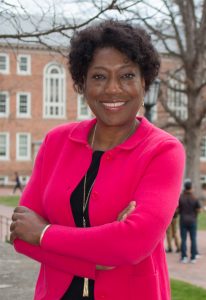If you attended any events please tell us about your experience:
Event Feedback
THE BENEFITS AND PURPOSE OF DOING A POSTDOC IN THE HUMANITIES
Sibby Anderson-Thompkins serves as the Special Assistant to the Vice Chancellor for Research (Diversity & Inclusion) and the Director of the Office of Postdoctoral Affairs. In her role, she leads the Carolina Postdoctoral Program for Faculty Diversity and diversity-related initiatives for the Office of the Vice Chancellor for Research. As director of OPA, she serves as the contact for the UNC’s Postdoctoral Policies and Grievance Procedures, Postdoctoral Travel Awards, and Postdoctoral Research Awards for Excellence (PARE). Sibby is available for individual or group consultations with postdoctoral scholars, faculty mentors or department administrators for issues and concerns related to postdoctoral policies or postdoctoral training and mentoring.
Dr. Anderson-Thompkins brings 20 years of experience in higher education administration. Her expertise is in serving and supporting the success of underrepresented groups. Previously, she served as an assistant dean in the Office of the Dean of Students and an assistant dean in the Office of Student Academic Counseling (now the Center for Student Success and Academic Counseling) here at Carolina. In addition, she served as an associate dean of student affairs at Hampshire College in Massachusetts and a clinical faculty member in education and dean of advising at Agnes Scott College in Georgia. She has also been an active member of the National Postdoctoral Association (NPA) serving as the NPA’s Diversity Officer and past member of the Advisory Group for the NPA’s NSF Paid ADVANCE Grant, as well as contributing to a book that resulted from the project, From PhD to Professoriate: The role of institutions in fostering the advancement of postdoc women. Most recently, she served on a committee for the National Academy of Sciences that authored the report, State of the postdoctoral experience for scientists and engineers revisited and a working group for the Association of Public and Land-grant Universities that issued the report, Increasing diversity in the biomedical research workforce.
China Medel’s research works at the intersections of Latinx Studies and Media Studies using critical, ethnic studies frameworks and new materialist interventions. Specifically I focus on the role of art and media in imagining and generating new modes of political recognition in the Americas. I teach courses in film and media studies, performance, border studies, and women of color feminism. Hailing from a rural community in Idaho, I am a first generation college student and proud Chicana. In addition to my scholarship and teaching,she is also a SONG (Southerners on New Ground) member working on local anti-criminalization campaigns.
Broadly, her research and teaching interests include visual media studies, performance, U.S.-Mexico border studies, Chicanx and Latinx art, hemispheric and transnational American Studies, social movements, and transnational and women of color feminism, and queer theory. Her current work focuses on the role of art and media in imagining and generating new modes of political recognition in the Americas. My current book project, “Spectral Aesthetics: Media and Alternative Visibilities at the U.S.-Mexico Border,” examines film, media, and digital performance art about the crisis of migrant death in the borderlands in the context of the border enforcement policy known as Prevention Through Deterrence. The book proposes that in a context of border enforcement that requires the visibility of racialized migrant bodies for policing and detainment, artists have innovated alternative aesthetic formations through which to make visible the crisis at the border while not relying upon schemas of racial visibility. This book project offers a theory of representation and recognition within the context of neoliberal governance that aims to disavow contemporary conditions of racial violence. Dr. Medel transitioned into her faculty appoint from the Carolina Postdoctoral Program for Faculty Diversity.
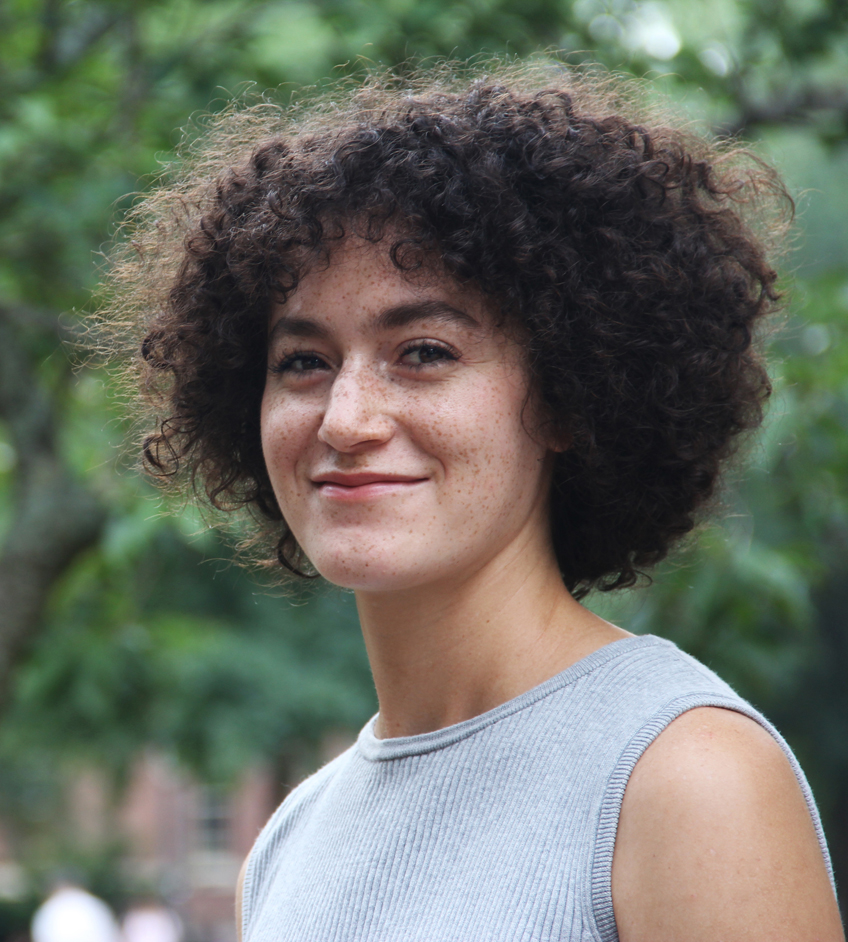 Kathryn Desplanque is a current fellow in the prestigious Carolina Postoctoral Program for Faculty Diversity in the department of Art an Art History at UNC Chapel Hill. She received her PhD in Art History from Duke University. She specializes in eighteenth- and early nineteenth-century French social caricature, visual culture, and the printed image. She is currently preparing a book manuscript that builds upon her dissertation which studied satirical images of artistic life in Paris between 1750 and 1850. Kathryn is also continuing research for a second book project that explores modular printed images in nineteenth century France, England, and America, and their various appropriations in popular culture. Her research engages the Digital Humanities by finding new strategies for organizing and analyzing large corpi of imagery using Qualitative Data Analysis software, in particular NVivo. She is a Research Advisory Board Member at NVivo’s parent company, QSR International. Learn more from Dr. Desplanque’s academic portfolio and her recent colloquium presentation.
Kathryn Desplanque is a current fellow in the prestigious Carolina Postoctoral Program for Faculty Diversity in the department of Art an Art History at UNC Chapel Hill. She received her PhD in Art History from Duke University. She specializes in eighteenth- and early nineteenth-century French social caricature, visual culture, and the printed image. She is currently preparing a book manuscript that builds upon her dissertation which studied satirical images of artistic life in Paris between 1750 and 1850. Kathryn is also continuing research for a second book project that explores modular printed images in nineteenth century France, England, and America, and their various appropriations in popular culture. Her research engages the Digital Humanities by finding new strategies for organizing and analyzing large corpi of imagery using Qualitative Data Analysis software, in particular NVivo. She is a Research Advisory Board Member at NVivo’s parent company, QSR International. Learn more from Dr. Desplanque’s academic portfolio and her recent colloquium presentation.
DOING INNOVATION, DIGITAL HUMANITIES, & PUBLIC HUMANITIES RESEARCH
Lucia Binotti‘s research focuses on the links between the Spanish and Italian languages in the Renaissance. Two major publications and about 27 articles on her CV are devoted to describing, analyzing and assessing the cultural mechanisms that led Spain to selectively import and imitate the values of the Italian Renaissance. This aspect of historical linguistics is grounded in cultural history. Her monograph The Theory Known as “primitive Castilian”: Nationalism and Linguistic Reflections in the Spanish Renaissance (Munster: Nodus Publikationen, 1995) examines the cultural context of the origins of Spanish linguistic consciousness. The book has been lauded by the way it illustrates how the political and religious beliefs of the time affect Renaissance linguistic history. Cultural Capital, Language and National Identity in Early Modern Spain (London: Tamesis, 2012) continues to develop the topic of the Renaissance theories about the origins and value of language, and how it was transformed by Spain’s involvement with the construction of imperial and colonial ideology. The book eases the reader through thorny issue of historiography and occupies an important place on the study of culture and its creations.
In the late 2000’s Dr. Binotti’s scholarship took “the digital turn,” as they say, and in 2011 she was the recipient of an NEH Digital Humanities Start Up Grant for the project Gnovis: Flowing Through The Galaxy of Knowledge. Gnovis is as a data harvesting and visualization tool designed specifically to enable visualization of data relevant to the humanities. In 2010, it was one of the first known Digital Humanities solutions to visualize linked data, at a time in which the application of Big Data research to the Humanities was unheard of. In 2013 and 2014, she designed a customized digital toolkit for my Rome Study abroad program that geolocates and visualizes thematic itineraries while enabling the organization and management of traditional content and allowing students to collaborate online. In 2015, Gnovis’ theoretical scope and the concrete usability of the Rome tool merged into larger DH scholarly project The Walkable Classroom (TWC). TWC leverages a set of intuitive digital tools that allow for the threading of humanistic content in a multimedia narrative layered over space, thus opening immense possibilities for the re-organization and re-interpretation of established textual content and offering a useful operational lens to all those who are currently interested in the intersection of conventional humanistic studies with the study of place, people and environment. In terms of design and scope, TWC aligns theoretically with the principles expounded by Michael Shank and Jeffrey Schnapp in the foundational manifesto (2011) that buttresses the inception of the Stanford Design Lab. As a prototype, TWC is a strong illustration of the arguments proposed by Alan Galey, Stan Ruecker and the INKE Team in “How a prototype argues,” (2010) where they explore the theoretical affinities shared by recent design and book history scholarship to demonstrate how, just as an edition of a book can be a means of reifying a theory about how books should be edited, so can the creation of an experimental digital prototype be understood as conveying an argument about designing interfaces. As of 2016, Dr. Binotti has authored several sub-projects stemming from the thinking context promoted by TWC technology: An Itinerant Introduction to Renaissance Culture; an Itinerant Introduction to Renaissance Art History; a digital revision of the survey course Intro to Medieval and Early Modern Spanish Literature. Currently, she is working on a theoretical framework within which to further explore TWC’s possibilities of loosening the traditional boundaries that constrain national and period definitions of cultures and literatures, by inviting use-based, transactional and transnational scholarly approaches to the spatial, environmental and mobile humanities.
Daniel Anderson is the Director of the Carolina Digital Humanities as well as the Director of the Digital Innovation Lab at The University of North Carolina at Chapel Hill. As a Professor of English and Comparative Literature, he studies digital rhetoric, teaching with technology, and alternative approaches to scholarship. His books on teaching include Connections: A Guide to Online Writing, Writing About Literature in the Media Age, and Beyond Words: Reading and Writing in a Digital Age. He also creates new media performance art and scholarship using the computer screen as a composing space.
To learn more check out Dr. Anderson’s website: http://iamdananderson.net/professing/
Max Owre is the Executive Director of Carolina Public Humanities. He started working with Carolina Public Humanities in 2009 when it was still the “Program in the Humanities and Human Values.” He served as Associate Director (2010-13) and Interim Director (2013-14) before assuming the position of Executive Director in July 2014.
A graduate of the University of Vermont, he obtained his PhD in modern European history from UNC-CH in 2008. Max is a lecturer in the History Department, teaching courses in European, world and colonial history since 2007. Max is a principal organizer, and frequent host and moderator of CPH Events. He also lectures frequently for CPH on various topics in French and European history.
DOING COLLABORATIVE, ENGAGED, AND COMMUNITY-BASED RESEARCH
 Michele Tracy Berger is Associate Professor in the Department of Women’s and Gender Studies. She holds an adjunct appointment in the Department of City and Regional Planning. She was awarded a Graduate Certificate in Women’s Studies in 1995 and her PhD in Political Science from the University of Michigan in 1998.
Michele Tracy Berger is Associate Professor in the Department of Women’s and Gender Studies. She holds an adjunct appointment in the Department of City and Regional Planning. She was awarded a Graduate Certificate in Women’s Studies in 1995 and her PhD in Political Science from the University of Michigan in 1998.
Her books include Workable Sisterhood: The Political Journey of Stigmatized Women with HIV/AIDS (Princeton University Press, 2004) and the co-edited collections Gaining Access: A Practical and Theoretical Guide for Qualitative Researchers (Altamira Press, 2003) and The Intersectional Approach: Transforming the Academy Through Race, Class and Gender (University of North Carolina Press, 2010). Workable Sisterhood won a ‘Best Book’ Award from the American Political Science Association and was nominated for a ‘Distinguished Book’ Award from the American Sociological Association. In 2006, she received an American Association of University Women (AAUW) ‘American Fellow’ award for her new work on African American mother and daughter communication on health and sexuality.
Her latest book Transforming Scholarship: Why Women’s and Gender Studies Students Are Changing Themselves and the World (Routledge 2011) definitively answers the question, ‘What can you do with an interest in women’s and gender studies?’ The book argues that not only are women’s and gender studies graduates able to find fulfilling employment, they also comprise an emerging vanguard of knowledge producers in the U.S. and globally, and maintain a strong commitment to gender equality and social justice after graduation.
Dr. Berger and her collaborator Dr. Cheryl Radeloff surveyed over 900 women’s and gender studies graduates (1995-2010) from around the globe about their career paths. This is currently the largest global data set about contemporary women’s and gender studies graduates.
Her teaching and research interests include multiracial feminisms, qualitative methods, and HIV/AIDS activism. She served as Vice-President of the National Women’s Studies Association from 2010-2014.
Patricia Parker (Ph.D. University of Texas at Austin) is Chair of the Department of Communication at the University of North Carolina at Chapel Hill, where she is also an associate professor of critical organizational communication studies and Director of the Graduate Certificate in Participatory Research. Professor Parker’s research, teaching, and engaged scholarship focus on social justice leadership and decolonizing organizational communication processes. She is co-editor (with Larry Frey) of the University of California Press book series, “Communication and Social Justice Activism.” Her book, Ella Baker’s Catalytic Leadership Praxis: A Primer on Community Engagement for Social Justice Leadership is due out in the series in 2020. That volume, along with her book, Race, Gender, and Leadership, other published scholarship, administrative work and social entrepreneurial activities, inform a sustained focus to intervene in problems at the intersections of power, identity, agency, and organizing.
Professor Parker has applied and disseminated a theoretically informed participative praxis for social justice leadership in a variety of contexts. As the inaugural Director of Faculty Diversity Initiatives for the UNC-CH College of Arts and Sciences (2012-2015), she developed the College’s diversity liaison program, catalyzing a network of critically engaged faculty leaders working for equity and inclusive excellence in their respective departments. She is founder and executive director of The Ella Baker Women’s Center for Leadership and Community Activism, a community-based not-for-profit organization building community power for social change and supporting girls’ and women’s leadership development, a venture supported by a 2006 Kauffman Faculty Fellowship for social entrepreneurship. Most recently, she helped to establish the Triangle Women in STEM Network, a women-led organization catalyzing diverse voices to advance women in STEM careers. Her next project will be a collaborative digital humanities initiative documenting women’s social justice leadership globally. Parker is the recipient of the UNC Office of the Provost Engaged Scholarship Award for teaching (2013), the University Diversity Award (2014), and the National Communication Association’s Engaged Scholars Service Award (Organizational Communication) (2010). She is senior personnel on the 2018 National Science Foundation (NSF) ADVANCE Grant awarded to UNC-Chapel Hill’s Center for Faculty Excellence.
Mark Katz is the Ruel W. Tyson, Jr. Distinguished Professor of Humanities and Director of the Institute for the Arts and Humanities. Professor Katz’s teaching and scholarship focus on music and technology, contemporary popular music, musical diplomacy, and the violin. His books include Capturing Sound: How Technology has Changed Music and Groove Music: The Art and Culture of the Hip-Hop DJ. He is former editor of Journal of the Society for American Music and served for many years on the National Recording Preservation Board.
Since 2013, Katz has directed Next Level, U.S. Department of State–funded program that sends American hip-hop artists abroad to foster cultural exchange in underserved communities. The program has now conducted workshops in twenty countries on five continents. In 2016, Katz was awarded the Royal Musical Association’s Dent Medal, which credited him with taking “musicology and hip-hop studies in bold new directions, creating a model of exemplary and ethical scholarship that internationalizes the discipline in productive ways.” In 2017, he received UNC’s University Diversity Award for Faculty, recognizing his contributions to the enhancement, support, and furtherance of diversity and inclusion on campus and in the community.
A former chair of UNC’s Department of Music, Professor Katz holds degrees from the College of William and Mary (B.A. in philosophy) and the University of Michigan (M.A., Ph.D. in musicology).
DEVELOPING YOUR CAPACITY FOR DOING SPONSORED RESEARCH
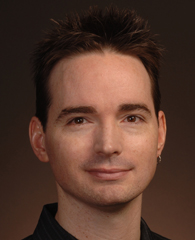 Torin Monahan is a Professor of Communication at The University of North Carolina at Chapel Hill. He has published over forty articles or book chapters and five books, including Surveillance in the Time of Insecurity, which won the Surveillance Studies Book Prize of the Surveillance Studies Network. Monahan is Co-Director of the international Surveillance Studies Network and Editor-in-Chief of the leading academic journal on surveillance, Surveillance & Society. Monahan’s research focuses on institutional transformations with new technologies, with a particular emphasis on surveillance and security programs. Areas of expertise include science and technology studies, surveillance studies, visual culture, ethnography, and contemporary social and cultural theory. He is currently working on a book project investigating artistic responses to public surveillance. Website: http://www.torinmonahan.com/
Torin Monahan is a Professor of Communication at The University of North Carolina at Chapel Hill. He has published over forty articles or book chapters and five books, including Surveillance in the Time of Insecurity, which won the Surveillance Studies Book Prize of the Surveillance Studies Network. Monahan is Co-Director of the international Surveillance Studies Network and Editor-in-Chief of the leading academic journal on surveillance, Surveillance & Society. Monahan’s research focuses on institutional transformations with new technologies, with a particular emphasis on surveillance and security programs. Areas of expertise include science and technology studies, surveillance studies, visual culture, ethnography, and contemporary social and cultural theory. He is currently working on a book project investigating artistic responses to public surveillance. Website: http://www.torinmonahan.com/
 Philip Hollingsworth joined the Institute for the Arts and Humanities in 2015, and serves as the Program Administrator for the Institute’s faculty programs. In this role, he coordinates and supports all faculty programs offered through the Institute for the Arts and Humanities. Before joining the IAH, Philip taught Spanish for ten years, instructing at the middle school, high school and undergraduate levels. He also spent four years as the manager of the Language Resource Center, which serves UNC’s Department of Romance Studies. Philip holds a PhD and a Master’s degree in Hispanic Literature from UNC-Chapel Hill and a B.A. in Spanish from Elon University.
Philip Hollingsworth joined the Institute for the Arts and Humanities in 2015, and serves as the Program Administrator for the Institute’s faculty programs. In this role, he coordinates and supports all faculty programs offered through the Institute for the Arts and Humanities. Before joining the IAH, Philip taught Spanish for ten years, instructing at the middle school, high school and undergraduate levels. He also spent four years as the manager of the Language Resource Center, which serves UNC’s Department of Romance Studies. Philip holds a PhD and a Master’s degree in Hispanic Literature from UNC-Chapel Hill and a B.A. in Spanish from Elon University.
Ashley Mattheis has over seven years of experience working in Research Development and funding for academic research. She has supported many successful projects ranging from individual grants and fellowships to large-scale multi, inter, and transdisciplinary research centers. Ashley has a firm belief that the true secret to successful funding is a research-centered approach to identifying funding opportunities and developing short, mid, and long term research funding plans. Her focus then, is supporting researchers in developing, planning, and implementing their research visions through translating funding trends, creatively matching funding opportunities to proposed research, and developing researcher skills in engaging with research funding paradigms. Ashley holds a B.A. in Women’s and Gender Studies and an M.A. in Communication, both from the University of North Carolina at Chapel Hill. Ashley is also currently an advanced PhD Student in Communication at Carolina. Website: http://aamattheis.com

